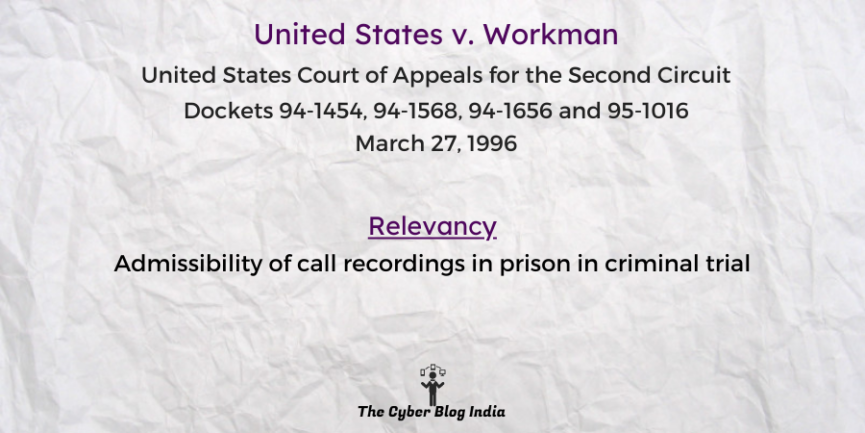United States v. Workman

United States v. Workman
80 F.3d 688
In the United States Court of Appeals for the Second Circuit
Dockets 94-1454, 94-1568, 94-1656 and 95-1016
Before Circuit Judge Feinberg, Circuit Judge Kearse and Circuit Judge Leval
Decided on March 27, 1996
Relevancy of the case: Admissibility of call recordings in prison in criminal trial
Statutes and Provisions Involved
- The Federal Wiretap Act, 18 U.S.C. §§ 2510-2522
- 21 USC §§ 841, 843(b)
Relevant Facts of the Case
- The L.A. Boys, a Buffalo-based drug trafficking organisation, committed violent crimes, including murders, kidnappings, and drive-by shootings, to further their drug operations. Prosecutors charged Green, Jamison, Rodgers, and 22 others with racketeering, conspiracy, and illegal drug sales. Green and Rodgers also faced charges of obstruction of justice and drug distribution.
- As the leader, Green directed operations even while serving a murder sentence. Prison phone recordings captured his involvement and critical evidence at trial.
- Authorities showed that Jamison bought and sold drugs, supplying low-level dealers and collecting profits. He was also tied to the 1989 murder of James Bolden and the attempted murder of James Wright. Evidence indicated Rodgers dealt cocaine at the street level and participated in discussions, including one at his home, where L.A. Boys members plotted to kill the group’s former leader.
Prominent Arguments by the Counsels
- The appellant’s counsel argued that the notification programme at the prison was successful in informing him that his call would be recorded as he used coded language to deceive authorities who could be listening to the tapes. Moreover, he frequently cautioned his interlocutor that the call might be monitored.
- The defendant’s counsel argued that the trial court made a mistake by admitting tape recordings of Green’s jail phone calls, which guards recorded without a judge’s permission, into evidence. Furthermore, the defendant’s counsel contended that the conversation recording violated Fourth Amendment rights.
Opinion of the Bench
- When an inmate receives repeated notice that calls placed on prison telephones are subject to surveillance, the evidence shows that he is aware of the monitoring program. If he uses the telephones, he implicitly consents to monitoring.
- The bench rejected the defendant’s counsel’s second argument, stating that only one participant in a conversation needs to agree to the monitoring to satisfy the requirements of the Fourth Amendment and that Green implicitly gave his consent.
Final Decision
- The court upheld the District Court’s decision.
